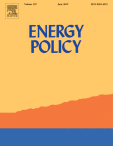The Energy Paradox in Seemingly Competitive Industries: The Use of Energy-Efficient Equipment on Heavy-Duty Tractor Trailers
Some federal agencies have suggested that, where there is split ownership between tractors and trailers, owners of trailers will underinvest in energy-saving equipment. We collected roadside data over three summers and modeled use of energy-saving equipment on trailers, and found associations consistent with cost-reducing behavior in the use of energy efficiency devices, but no evidence to support the agencies’ claims.
Highlights
- EPA claims that trucking firms fail to use energy-saving devices with cost-savings.
- New data show energy-saving equipment use is consistent with conventional theory.
- No evidence for claim of split incentives with separate tractor and trailer owners.
- Agencies should rigorously review empirical basis for claims of cost-effectiveness.
- Agencies should test for market failure-based claims of large cost savings.
Abstract
Several federal agencies claim the existence of an energy paradox in competitive markets in their benefit-cost analyses: firms fail to use energy-saving equipment that on net would reduce their costs. Such findings appear incompatible with neoclassical views that private firms in competitive markets will seek to minimize costs. EPA and NHTSA (2016) justify their findings in part by claiming that owners of trailers pulled by others underinvest in energy-saving equipment because the trailer owners incur the costs of such investments while tractor owners get the benefits. We collected roadside data over three summers and model use of energy-saving equipment on trailers. We find associations consistent with cost-reducing behavior in the use of energy efficiency devices, such as skirts and automatic tire inflation devices, but no evidence that different ownership of tractors and trailers is associated with reduced use of energy-saving equipment on trailers. We recommend that EPA and NHTSA assess the in-use cost-effectiveness of such equipment and rigorously review the empirical basis for claims of market failures in competitive markets before claiming significant private economic gains in rulemakings.
Authors

Randall W. Lutter






